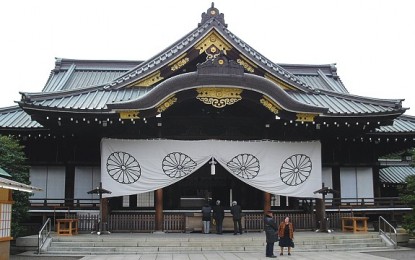Yasukuni Shrine’s chief priest forced to quit after criticizing Emperor for not visiting war-linked shrine
by Reiji Yoshida

Yasukuni – a Meiji-era invented tradition
In one of the most shocking scandals to hit Tokyo’s 149-year-old war-linked Yasukuni Shrine, the shrine’s top priest has been forced to resign after admitting his reported remarks harshly criticizing Emperor Akihito were genuine.
According to the Shukan Post magazine, Kunio Kohori argued in a meeting at the shrine on June 20 that the Emperor is “now trying to crush Yasukuni Shrine” by not visiting it and by instead making trips to commemorate victims of the war Japan waged in the 1930s and 1940s.
Kohori also argued that, because Emperor Akihito hasn’t paid a visit to the shrine since his enthronement, Crown Prince Naruhito and Crown Princess Masako are also unlikely to go there after he abdicates next spring.
Kohori also alleged the Crown Princess “detests Shinto and Shinto shrines,” according to the weekly magazine.
The magazine claimed it has a 110-minute voice recording of the meeting and uploaded part of it to its Twitter account (@News_MagVi).
Criticizing the emperor is taboo for Shinto priests, particularly those at Yasukuni Shrine, which was established in 1869 at the instruction of Emperor Meiji.
The shrine sent a brief statement by fax to media outlets Wednesday, saying Kohori had already expressed his intention to resign when he visited the Imperial Household Agency and apologized for his remarks. The shrine also admitted Kohori’s remarks were “extremely improper.”
A new top priest will be chosen at a general meeting of the shrine on Oct. 26, according to the statement.
Emperor Hirohito, posthumously known as Emperor Showa, did not visit Yasukuni Shrine after Japanese class-A war criminals from World War II were enshrined there in 1978 — including Hideki Tojo, a wartime prime minister and general — alongside 2.46 million war dead.
Emperor Akihito has repeatedly expressed “deep remorse” over World War II, while the shrine and many of its supporters have claimed Japan fought a war of self-defense.
The common interpretation of the Constitution bans the emperor from engaging in any political activity. A visit to Yasukuni would likely cause major controversy, an apparent reason Emperor Akihito hasn’t visited since acceding to the Chrysanthemum Throne.

A reader has written in to question the translation by The Japan Times, which says:
‘Kohori also alleged the Crown Princess “detests Shinto and Shinto shrines,” according to the weekly magazine.’
The key expression is 神社神道 (Jinja Shinto), which is wrongly translated as ‘Shinto and Shinto Shrines’. [You can find the original text here: https://lite-ra.com/2018/10/post-4305.html%5D
‘Jinja Shinto’ is the organised, centralised type of Shinto based on shrines and held together by Jinja Honcho, which has political ties with the rightwing and Nippon Kaigi.
I suspect Masako does not care for the backward looking nature of that organisation and its apparent desire to reinstate State Shinto. She had the educational background of an intelligent cosmopolitan modern female, so it wouldn’t be surprising if she had a distaste for authoritarian, reactionary and patriarchal thinking.
Saying she detests Shinto shrines is a very odd and entirely false translation.